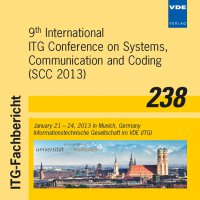A Corrected Disproof of the Strong Simplex Conjecture
Conference: SCC 2013 - 9th International ITG Conference on Systems, Communication and Coding
01/21/2013 - 01/24/2013 at München, Deutschland
Proceedings: SCC 2013
Pages: 5Language: englishTyp: PDF
Personal VDE Members are entitled to a 10% discount on this title
Authors:
Lazich, Dejan E.; Senger, Christian; Bossert, Martin (Institute of Communications Engineering, Ulm University, Ulm, Germany)
Abstract:
In the disproof of the Strong Simplex Conjecture presented in [1], a counterexample signal set was found that has higher average probability of correct optimal decoding than the corresponding regular simplex signal set, when compared at small values of the signal-to-noise ratio. The latter was defined as the quotient of average signal energy and average noise power. In this paper, it is shown that this interpretation of the signal-tonoise ratio is inappropriate for a comparison of signal sets, since it leads to a contradiction with the Channel Coding Theorem. A modified counterexample signal set is proposed and examined using the classical interpretation of the signal-to-noise ratio, i.e., as the quotient of average signal energy and average noise energy. This signal set outperforms the regular simplex signal set for small signal-to-noise ratios without contradicting the Channel Coding Theorem, hence the Strong Simplex Conjecture remains disproven.


